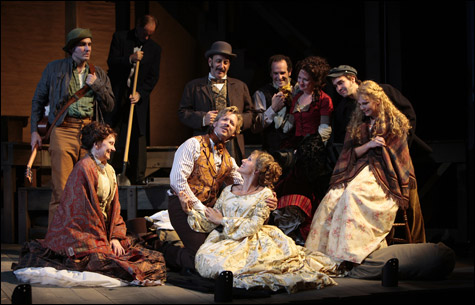
THE PREMISE SEEMS IRRESISTIBLE If only the execution didn’t wander cross-country. |
It’s nifty that Boston has snagged the world premiere of Richard Nelson’s new play, How Shakespeare Won the West, which opens the season at the Huntington (and runs through October 5). But this talented, prolific playwright blows hot and cold, and Shakespeare isn’t one of his successes — though the premise seems just about irresistible. Set in the mid-19th century and based on real events, the play is about a New York tavern owner named Thomas Jefferson Calhoun (Will LeBow) who, inspired by a visiting Ohio actor’s tales of prospectors in the California gold rush who revere Shakespeare, assembles a theatrical troupe to trek across country to perform for them.
The company includes Calhoun’s family — his wife, Alice (Mary Beth Fisher), who retired from the stage upon becoming pregnant and has always longed to return, and their daughter, Susan (Sarah Nealis), an eager novice. They’re joined by the Ohio thespian Buck Buchanan (Erik Lochtefeld) and Susan’s childhood friend John Gough (Joe Tapper). They take on a couple who claim to be English (Jeremiah Kissel and Kelly Hutchinson) but are obviously inauthentic both as Brits and as a couple (he’s gay), and an older character man (Jon De Vries). Their star is a handsome drunk and sometime celebrity (Chris Henry Coffey) who just got thrown out of another company; his wife, a gifted actress to whom he has just become reconciled, begs to come along too.

The play, which is performed without an intermission, is episodic; the problem is that it’s also misshapen. It begins as a genial — and not terribly eventful — comedy, but halfway through it makes an abrupt tonal shift, as the troupe is beset by internal and external difficulties. Handling the personal problems of the actors (illness and sexual jealousy), Nelson veers into melodrama. Then, when the actors land in South Dakota and find themselves drawn into the Indian wars, the play becomes didactic and heavy-handed as the playwright feels the need to address the themes of racism and religious intolerance. For a space, the troupe is broken up and Buck winds up being adopted by religious zealots who teach him to shoot at Native Americans and blacks. This dreadful section, which is reminiscent of the worst excesses of Little Big Man, is jarring; I felt as if I’d wandered into some other play. Moreover, the drama keeps getting interrupted by narration shared by the ensemble in the old-fashioned reader’s-theater style, in which each character describes his or her own actions.
LeBow uses his Ichabod Crane looks and wobbly stentorian voice to good effect, especially when he’s called upon to perform part of the last scene of King Lear. But under Jonathan Moscone’s direction, the other actors are exhaustingly overstated, as if Moscone thought that pioneers comported themselves with robustness and high spirits to an almost inhuman degree. The misshapenness of the production is partly the result of this performance style, which gives an equal emphasis to everything. You long for the rhythms of ordinary conversation — and for acting that doesn’t keep announcing itself. And though the staging is perfectly competent, it doesn’t draw on all the resources of Antje Ellermann’s multi-leveled set, a pile of wooden pillars and platforms.
There is, however, one fine theatrical effect at the end, a triumphant borrowing from The Threepenny Opera that I won’t reveal. Earlier, the troupe, at the suggestion of Buffalo Bill Cody (Ron Campbell), puts on a command performance of Lear for an Indian chief who has captured the players, and we see it in silhouette, as a collage of dramatic peaks. This sequence is the visual and emotional highlight of How Shakespeare Won the West, and it comes closest to fulfilling the promise of Nelson’s wonderful subject.